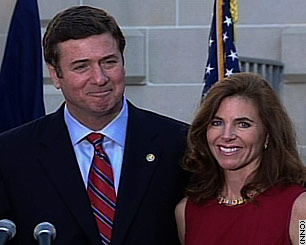The numbers suggest a return to the political landscape that preceded Bush and his effort to use policies and political appointments to build what some of his aides called an effort to restructure American politics. Democrats, for instance, won women by 55 percent to 43 percent, their highest margin since 1988. They won independents, the key swing vote, by 18 percentage points, the biggest margin in House races in the past 25 years.
Republicans also suffered losses among the groups White House political adviser Karl Rove specifically targeted for support over the past six years. Democrats benefited from a 14-point increase among Latinos since the last election, and also won their highest percentage of white voters (47 percent) since 1992. Democratic support among white Protestants -- the base of the modern GOP -- returned to the levels the party enjoyed before Bush's 2000 election. Democrats saw a 10-point gain among Catholics.
Sara Taylor, the White House political director, said the Democrats' gains do not signal a big shift in American politics. "It is premature to assume that because they made some gains . . . that this is some sort of trend toward the Democratic Party," Taylor said. Pointing to the 1938 election when Democrats lost 72 House seats in the sixth year of President Franklin D. Roosevelt's administration, Taylor argued that this year's elections in a hostile political climate -- buffeted by the Iraq war and scandals -- are an interruption, not an end, to the effort to assemble a lasting GOP majority.
The exit polling underscored how sour the political environment was for the GOP. Voters expressed big concerns about corruption, the Iraq war and the direction of the country. This year's survey, however, did not measure specifically the issues that motivated voters most.
Voters most frequently labeled "corruption and scandals in government" as "extremely important" to their vote for the House, but calling this an ethics election would be an over-interpretation, analysts said.
Strategists in both parties agree it was the Iraq war -- and Bush's failure to win this fall's debate over the military operation -- that animated this year's elections most. "Iraq sat at the middle of this election and shaped political attitudes," said GOP pollster Bill McInturff.
The strategists said the Mark Foley sex scandal, which dominated races just as voters were tuning in, crystallized voter concerns with GOP governance. In the end, undecided voters broke heavily against the GOP in the final days.
"The war and scandals in Congress were the doors that gave us an opportunity," said Democratic Congressional Campaign Committee Chairman Rahm Emanuel (D-Ill.).
Still, the damage could have been worse for Republicans. Their losses were not out of line with the historical average for the sixth year of a presidency. "What you saw was not some big, huge wave election," Taylor said. "I would argue we did a very good job of staving one off." The White House cited its own analysis concluding that Republicans won 13 of 19 races decided by 5,000 votes or less, crediting their turnout program for preventing much deeper losses.
But Democrats clearly did a better job at turning out their voters than in recent elections, with exit polling showing them winning 53 percent to 45 percent nationally. They also did a better job of recruiting and preparing their candidates, strategists in both parties said.
On the GOP side, the finger-pointing began soon after the results were clear. GOP officials faulted several lawmakers for blowing their races. For months, the National Republican Congressional Committee warned incumbents that this year's headwinds could endanger them -- even if they had not faced serious races before.
The NRCC went to Rep. Gil Gutknecht (R-Minn.) in the summer with a poll that showed him in real jeopardy in his race against teacher Tim Walz (D). Gutknecht did not adequately heed that warning, falling to Walz in the southern Minnesota 1st District.
In Iowa's 2nd District, the NRCC noticed months ago that Rep. Jim Leach (R) could well lose to Democrat Dave Loebsack. National Republicans did not want to tip off Democrats to his troubles, so they decided against running ads there. Instead, GOP aides said, they decided to pay for a direct-mail effort on Leach's behalf, but just as it was about to be sent out, Leach insisted it be canceled. He lost to Loebsack on Tuesday night.
In Pennsylvania's 4th District, Rep. Melissa Hart (R) ignored repeated warnings from national Republicans to go negative early on her opponent, Jason Altmire (D). Hart waited -- out of fear for raising Altmire's name recognition. She waited too long.
Democrats, similarly, made decisions that won them crucial seats in building their House majority.
Take Pennsylvania's 10th District, where Democrat Chris Carney defeated Rep. Don Sherwood (R). Carney had built a considerable lead by running ads featuring Republican voters in the district talking about Sherwood's admission of an extramarital affair and allegations that he had strangled his mistress. Carney had gone off the air with those ads, and Sherwood's poll numbers had begun to bounce back. Emanuel, Democratic operatives said, called Carney and advised him strongly to go back to the mistress ads. Carney complied, and defeated Sherwood.
In New Hampshire's 2nd District, Emanuel visited late in the summer to check up on Democratic candidate Paul Hodes. During that visit, Emanuel asked Hodes whether Rep. Charles Bass (R-N.H.) had any idea of his vulnerability. Hodes said no. Emanuel counseled Hodes to lay low, springing the campaign on Bass in the final weeks. He did just that -- beating Bass in a major surprise on Tuesday.
Emanuel's DCCC also made a number of key last-minute funding decisions that led to surprise wins. After pledging not to spend money to defeat Rep. Anne M. Northup (R-Ky.), the DCCC poured $500,000 into the race in the final week, helping John Yarmuth (D) pull out an unexpected victory. In Kansas, the DCCC saturated the airwaves with television ads attacking Rep. Jim Ryun during the last days of the race, leaving Republicans little time to respond. Ryun lost to Democrat Nancy Boyda.
Much of the Democrats' success in the Senate could be credited to Charles E. Schumer (N.Y.), who as chairman of the Democratic Senatorial Campaign Committee convinced a number of top-tier candidates to run -- often ignoring complaints from various interest groups in order to select the candidates he and aides deemed most electable.
Early in the 2006 election cycle, for instance, Schumer called Pennsylvania Gov. Edward G. Rendell (D) to find out who the best candidate was to oust Sen. Rick Santorum. Rendell told him that it was state Treasurer Robert P. Casey Jr. but that national Democrats would not want Casey because he is opposed to abortion rights. Schumer said that deviation from Democratic orthodoxy was not a problem: "The days are over where a Democrat has to check 28 boxes to get our support."
Republican strategists said they might have been able to win an extra seat or two if the National Republican Senatorial Committee has raised more money -- and spent it more wisely. The strategists questioned why GOP officials spent so heavily in New Jersey, where they lost by seven points, and waited so long to move more money into Montana, where Sen. Conrad Burns lost narrowly.







